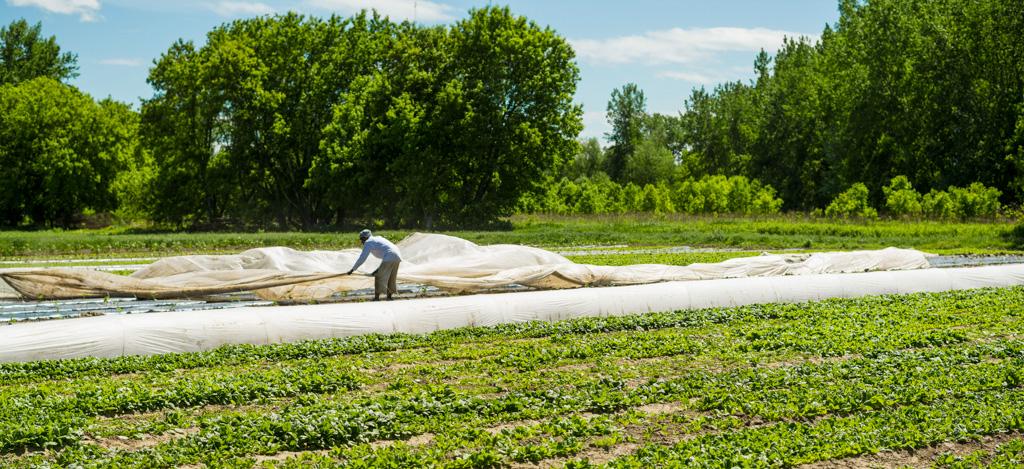high-res photos video of the rally
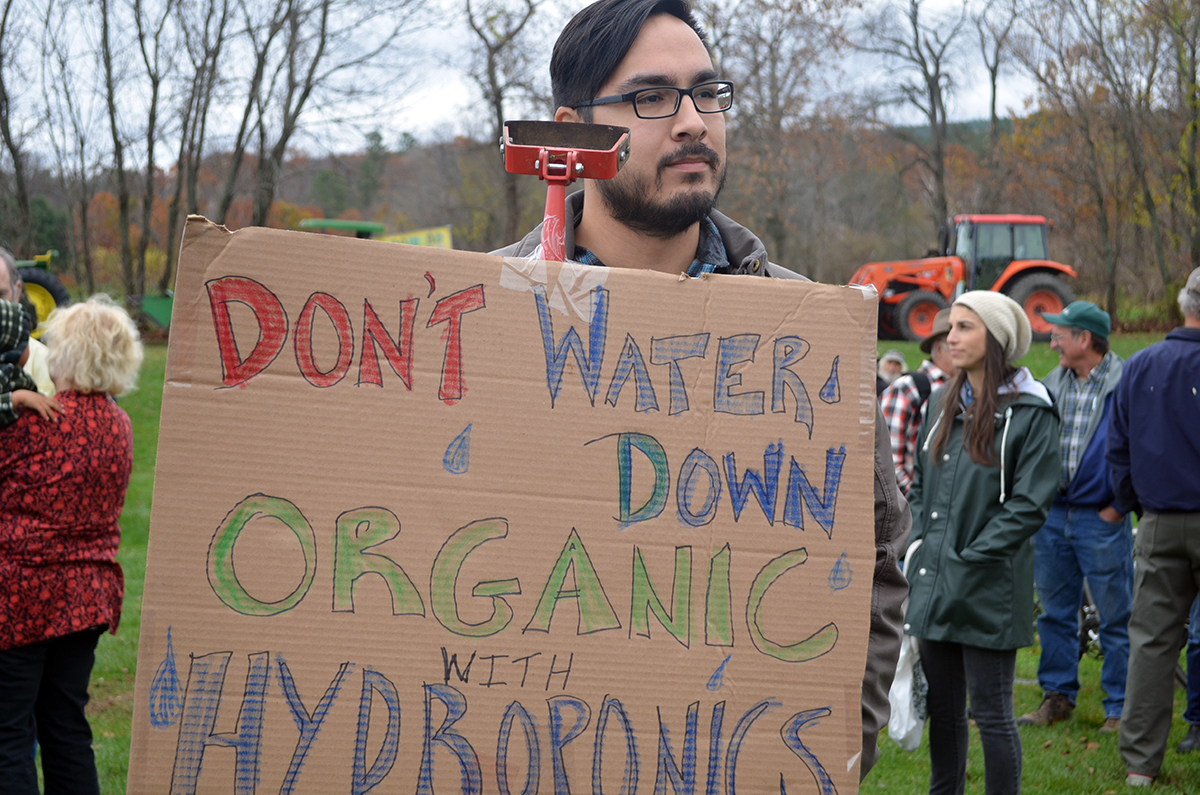 Organic farmers and their supporters came from all over New England to rally and protest the federal government’s allowance of hydroponically-grown fruits and vegetables to be labeled as “USDA Certified Organic.” Among the speakers who addressed a crowd of roughly 250 farmers, food advocates and organic consumers on Sunday, October 30th were U.S. Senator Patrick Leahy (D-VT), U.S. Representatives Peter Welch (D-VT) and Chellie Pingree (D-ME), farmer/authors Eliot Coleman and Will Allen, and organic farmer David Zuckerman, who is also a state senator and a major candidate for Lieutenant Governor in Vermont.
Organic farmers and their supporters came from all over New England to rally and protest the federal government’s allowance of hydroponically-grown fruits and vegetables to be labeled as “USDA Certified Organic.” Among the speakers who addressed a crowd of roughly 250 farmers, food advocates and organic consumers on Sunday, October 30th were U.S. Senator Patrick Leahy (D-VT), U.S. Representatives Peter Welch (D-VT) and Chellie Pingree (D-ME), farmer/authors Eliot Coleman and Will Allen, and organic farmer David Zuckerman, who is also a state senator and a major candidate for Lieutenant Governor in Vermont.
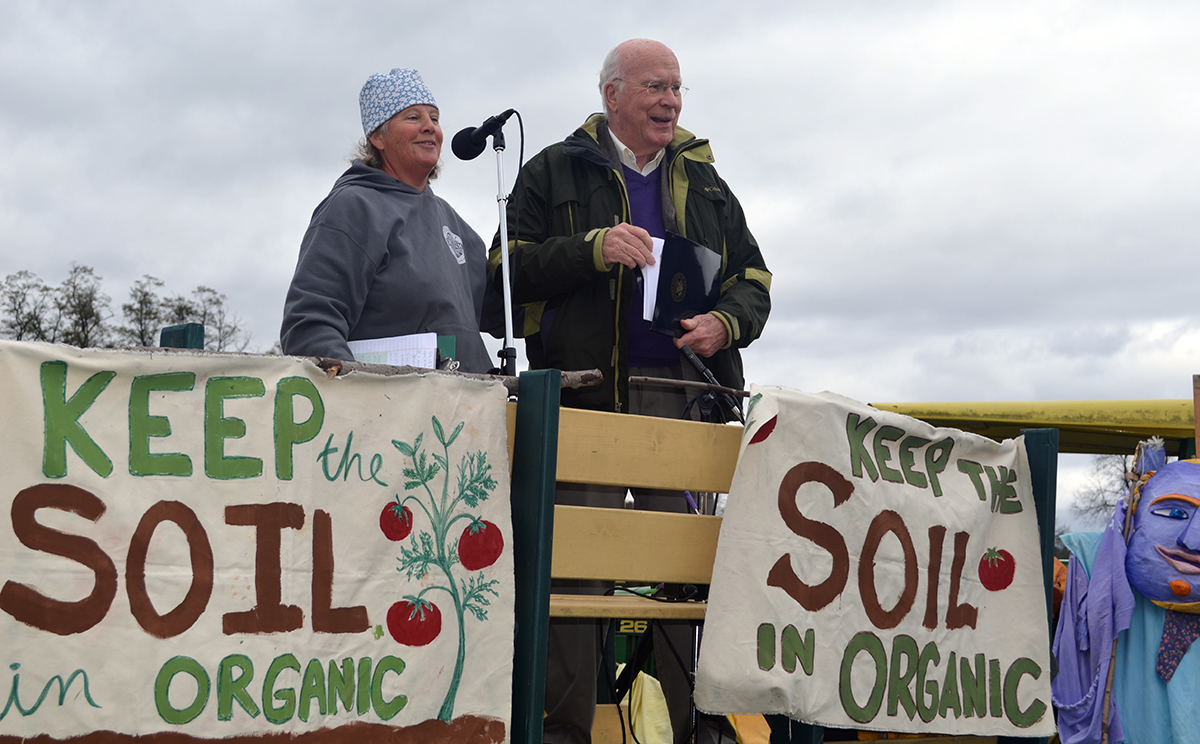 Senator Leahy (pictured here with Enid Wonnacott, executive director of NOFA-VT), is a long time champion of the organic farming movement. He challenged the crowd to keep the pressure on the U.S. Department of Agriculture.
Senator Leahy (pictured here with Enid Wonnacott, executive director of NOFA-VT), is a long time champion of the organic farming movement. He challenged the crowd to keep the pressure on the U.S. Department of Agriculture.
“I know the fight we had to go through to get the original organic regulations passed,” Leahy said. “The Organic Food Production Act is one of my proudest pieces of legislation. Every so often someone will try to undercut it. We know what grown in the soil means, and we know what hydroponic means. I want ‘organic’ to mean organic!”
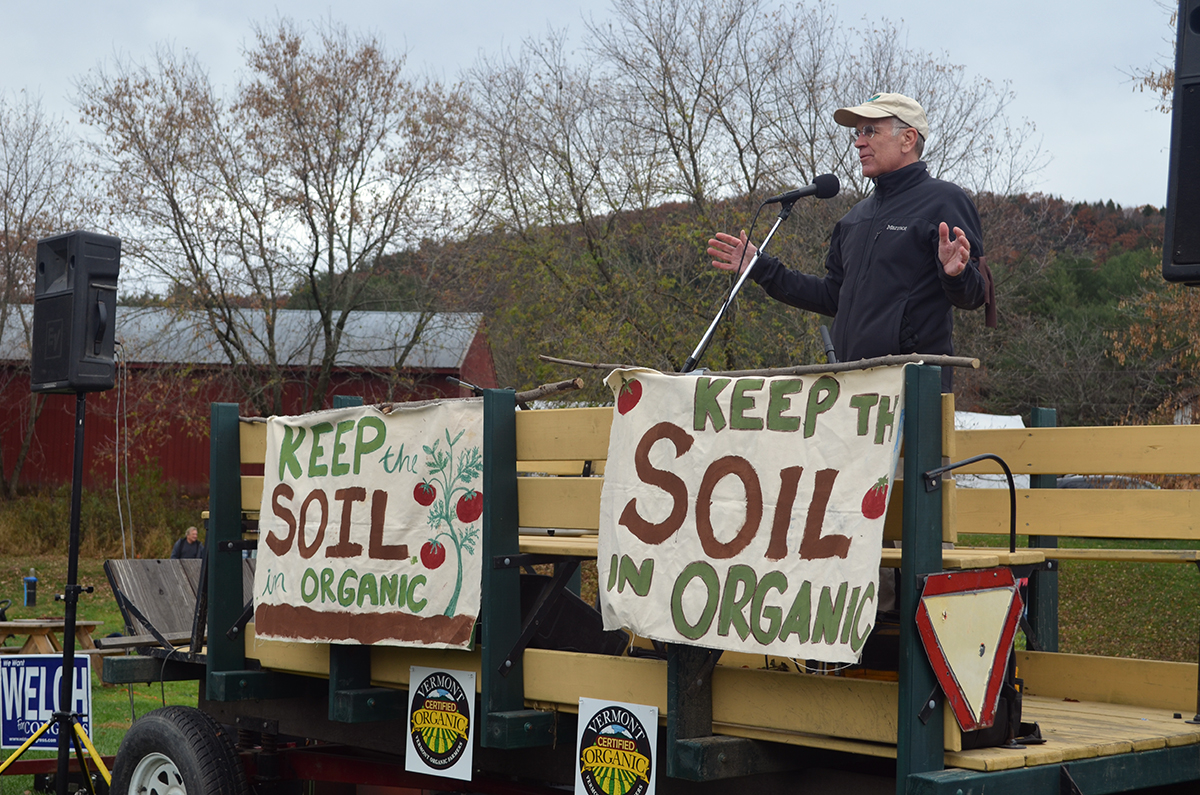 “I’m not against hydroponic, but I am against freeloading,” said Congressman Peter Welch (D-VT), standing on a farm wagon perched behind a pile of rich compost. “You’ve got folks, including ‘Big Ag,’ who want a free ride,” Welch said. “They want to get the benefit of the hard work that organic farmers do and take some of that market share with a label that wasn’t earned.”
“I’m not against hydroponic, but I am against freeloading,” said Congressman Peter Welch (D-VT), standing on a farm wagon perched behind a pile of rich compost. “You’ve got folks, including ‘Big Ag,’ who want a free ride,” Welch said. “They want to get the benefit of the hard work that organic farmers do and take some of that market share with a label that wasn’t earned.”
Vermonter Dave Chapman, an organic tomato producer who served on the USDA Hydroponic Task Force, told the crowd that the hydroponic incursion has become an “invasion,” as more and more hydroponic producers from around the world discover that they can now gain access to America’s booming organic market, with total product sales of $43.3 billion in 2015, according to the Organic Trade Association.
Peppers from Dutch greenhouses that could never be certified as organic in Holland may become “organic” when they cross the border, both Welch and Chapman explained. Hydroponic lettuce and tomatoes from Mexico and Canada are now pouring into the United States. Driscoll’s, the world’s largest berry grower, now has over 1,000 acres of hydroponic berry production.
“This hydroponic invasion has been almost invisible to the farmers and eaters of America, as no hydroponic food is labeled as such,” said Chapman. “The more that I learned serving on the USDA Task Force, the worse it got. Who knew that over 1000 acres of Driscoll’s “organic” berries were actually hydroponic? None of us knew.”
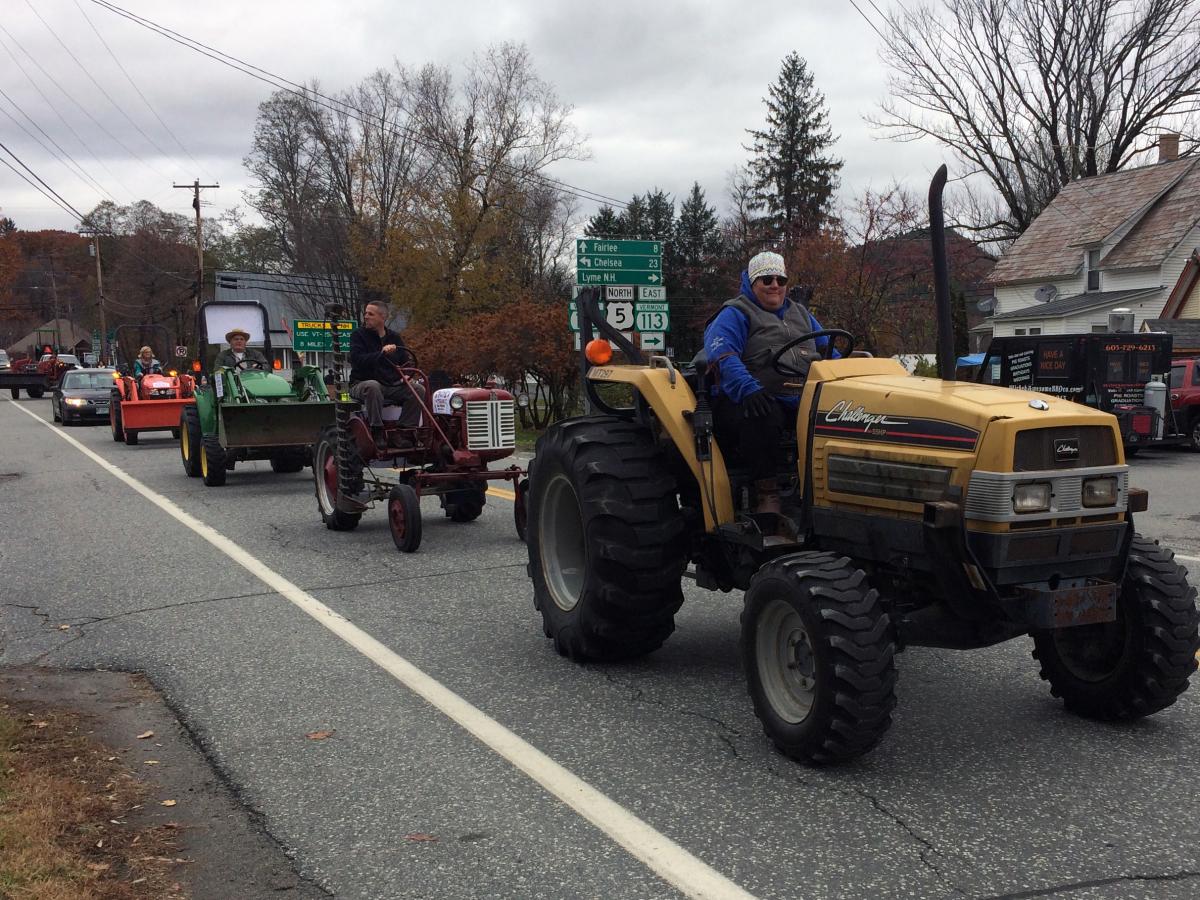 Organic farmers are more likely to be at work on the farm than driving long distances to share their concerns; but they came from as far away as Maine, Pennsylvania, and New York. The Rally in the Valley began at noon on Sunday, October 30th, with a 26-tractor cavalcade that started at Long Wind Farm in East Thetford, VT, and rolled slowly to nearby Cedar Circle Farm. “Keep the Soil in Organic” and “Take Back Organic” were among the hand-made signs that marchers carried as they sang to onlookers. NOFA Vermont’s twelve-foot-tall puppets, depicting the sun and the moon, led the way.
Organic farmers are more likely to be at work on the farm than driving long distances to share their concerns; but they came from as far away as Maine, Pennsylvania, and New York. The Rally in the Valley began at noon on Sunday, October 30th, with a 26-tractor cavalcade that started at Long Wind Farm in East Thetford, VT, and rolled slowly to nearby Cedar Circle Farm. “Keep the Soil in Organic” and “Take Back Organic” were among the hand-made signs that marchers carried as they sang to onlookers. NOFA Vermont’s twelve-foot-tall puppets, depicting the sun and the moon, led the way.
Organic farming has grown from a small, niche market to a booming, $40-billon industry that “has been great for our rural economy, and we don’t want anything interfering with that,” U.S. Representative Chellie Pingree (D-Maine) told rally-goers. “It is our job to make sure we preserve that brand.” Pingree, who runs an organic farm in New Haven, Maine, warned farmers what they’re up against: “There are 1,200 lobbyists on the hill that work for the agriculture and food processing industry. They spend $350 million dollars a year on forming opinions in Washington, and that is more than the defense industry.”
Definition of “Organic”
In 1980, USDA Secretary Robert Bergland initiated a study, Report and Recommendations On Organic Farming, which stated: “Soil is the source of life. Soil quality and balance are essential to the long-term future of agriculture. Healthy plants, animals and humans result from balanced, biologically active soil.”
“Organic has always meant grown in the soil,” Eliot Coleman, an influential author and spokesman for the organic farming movement in the U.S., told the crowd at the Rally. “We refuse to let the promise of organic agriculture be compromised by profiteers. We have won before and we will win again.”
Renewing the soil without pesticides or chemical fertilizers is also one of the few solutions to global warning, noted Will Allen from Cedar Circle Farm. “We can be the solution to climate change,” Allen said. “How are we going to sequester carbon in water? Hydroponics is going backwards. Regeneration is trying to take emissions that have already been produced and put them back in the soil,” he told the crowd. “Our soils are our single biggest sink for carbon so that we can actually fix climate change by taking all those greenhouse gasses and putting them back in our soils, and we know we can do that with organic farming.”
Agrarian elder Jake Guest looked back on his many years as an organic vegetable farmer. He recalled helping to compose the first NOFA organic standards by the light of a kerosene lamp many years ago. He and his colleagues were greatly influenced by the books written by earlier organic pioneers such as Albert Howard, Eve Balfour, Rodale, and Albrecht. “They all wrote about soil as the basis for organic farming. We have a right to the word organic. This hydroponic bullshit is a perversion,” said Guest.
“We’ve come to call the materials we can use in organic production, ‘amendments’,” mused Guest. “Which, according to Webster means ‘materials that aid plant growth indirectly by improving the condition of the soil.’ It is such a bizarre concept that you can take what we call ‘amendments’ and make it the whole system.”
Organic farmers believe that a healthy soil community, with myriad species of large and small organisms, and a blend of mineral and organic materials, provides plants with what they need for true health. In an organic system, plants are not passive consumers of fertilizers, but are dynamic energy sources that, through photosynthesis, provide food for the many soil organisms that in turn feed the plants.
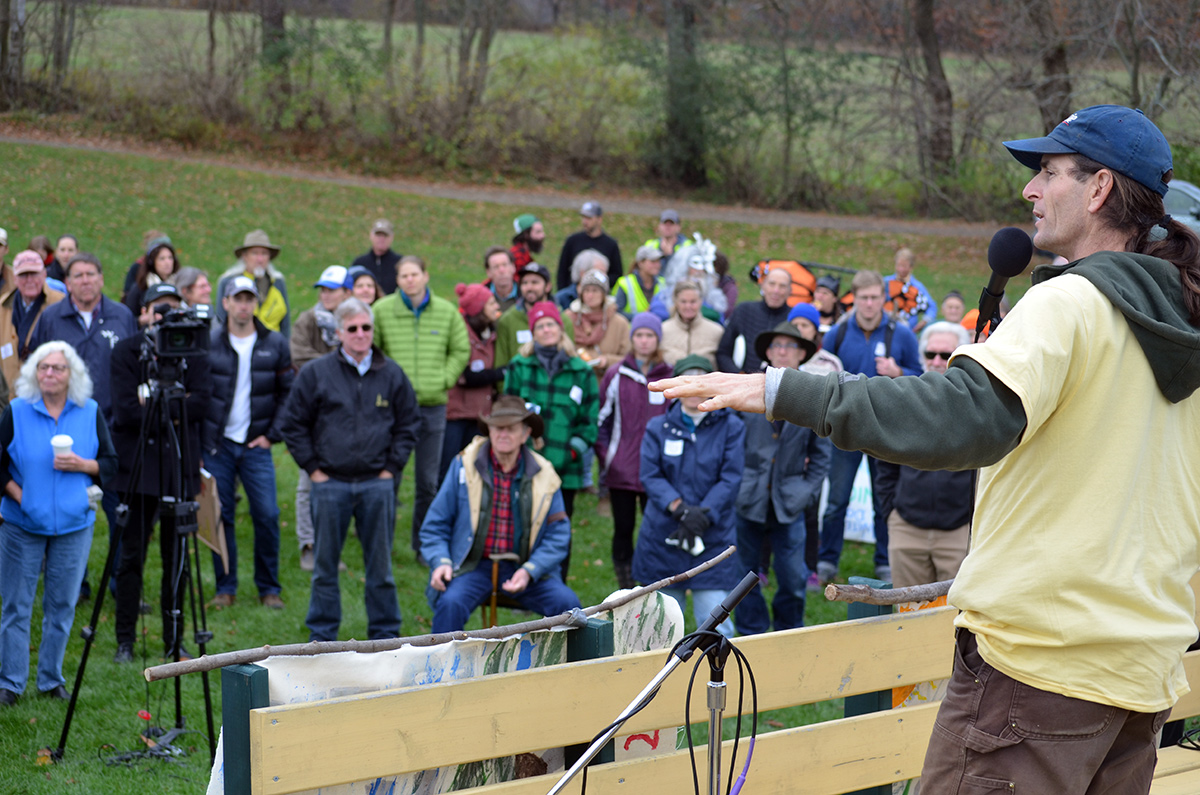 David Zuckerman added to this idea by saying that, “organic without soil is like democracy without people. What happens in our soil is the combined ecosystem that makes our food possible.”
David Zuckerman added to this idea by saying that, “organic without soil is like democracy without people. What happens in our soil is the combined ecosystem that makes our food possible.”
The National Organic Program is the branch of the United States Department of Agriculture (USDA) that administers the standards for organic certification. It has struggled with controversy in recent years as so-called “Big Ag” makes its presence felt in the organic realm.
Most hydroponic production facilities in the U.S. were started after the 2010 recommendation from the National Organic Standards Board (the advisory board to the USDA) that called for excluding all hydroponics from the organic label. And yet, since that 2010 recommendation, the USDA has welcomed hydroponic production into the organic certification program, going so far as to issue a clarifying statement in 2014 that hydroponic production qualifies as organic if the companies use “permitted” fertilizers.
Opposition to that decision has been building steadily in the past few years, as organic farmers and consumers have gradually discovered what is happening. In 2016, a letter calling for a moratorium on granting the organic label to all new hydroponic production was signed by 45 organizations, including NOFA, Beyond Pesticides, Center For Food Safety, Organic Consumers Association, Food Democracy Now!, Soil Association, and Cornucopia Institute. These organizations represent over 2 million members. Beyond that, U.S. Senators Patrick Leahy and Bernie Sanders, along with Congressman Peter Welch, have called for a moratorium on new hydroponic certification. The USDA has declined all these requests for action.
Upcoming NOSB meeting
On November 16, the National Organic Standards Board will once again consider a proposal to prohibit organic certification to hydroponic producers. The Rally was organized to send a strong message to the Board in advance of their upcoming vote. Vermont farmers David Miskell and Dave Chapman, along with NOFA-VT staff Nicole Dehne and Maddie Monty will be attending the NOSB’s St. Louis meeting to testify and show a video of the Rally with a unified message from the Northeast. Whichever way the Board votes, it is likely that it will be a long struggle before the USDA will actually prohibit hydroponics.

